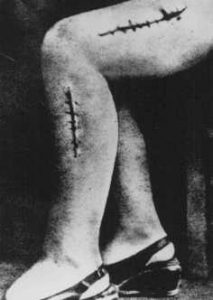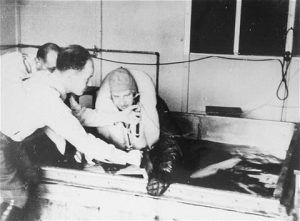Respect for autonomy is one of the fundamental principles of medical profession and I would argue that it must be given a special status because of its history in the medical profession. Until the mid-20th century, Paternalistic behavior on behalf of the physicians towards the patients was encouraged with the mindset that physicians know best and the patients should not be bothered with medical decisions that involves complex science and often weak evidence. However, this attitude changed during the mid-20th century because of the revelations of Nazi human experimentation after the World War 2, for the most part.
I was very concerned during our class discussion about moral status when few people argued that prisoners could potentially be given a lower moral status as a result of their moral transgressions. The notion of seeing a fellow human as a lesser moral agent has very disastrous consequences and must never be entertained regardless of the person’s transgressions or supposed inferiority. The absolutely chilling nature of Nazi human experimentation and the justifications given for it by the German physicians involved serve as an irrefutable evidence for my argument.
During the World War 2, a number of German physicians conducted extremely painful and deadly experiments on thousands of prisoners in the concentration camps. The experiments range from the ones aimed to improve the survival of soldiers in the battlefields such as high-altitude experiments, freezing experiments and seawater consumption experiments, to the ones aimed at creating pharmaceuticals and treatments of diseases such as malaria, typhus, TB, typhoid, hepatitis (United). Some prisoners were exposed to phosgene and mustard gas in order to test antidotes (United). The experiments also included the ones aimed that sought to advance the racial and ideological views of Nazi Germany. Such experiments included experiments on conjoined twins, sterilization procedures and serological experiments to determine the differential immunity of different “races” (United). Some were also aimed at establishing “Jewish racial inferiority” (United). The accounts of these experiments is testament to the horrid consequences of a very twisted ideology.


During the Nuremberg trials, German physicians gave justifications for their experiments. One of them, Dr. Gerhard Rose said:
“Without these experiments, the vaccines, which were recognized as useless, would not have been produced in large quantities. The victims of this Buchenwald typhus test did not suffer in vain and did not die in vain. There was only one choice, the sacrifice of human lives, of persons determined for the purpose, or to let things run their course, to endanger the lives of innumerable human beings… Aside from the self-experimentation of doctor, which represents a small minority if such experiments, the extent to which subjects are volunteers is often deceptive. In the majority of such cases, if we ethically examine facts, we find an exploitation of the ignorance, the frivolity, the economic distress, or other emergency on the part of the experimental subjects” (Jay).
The extent to which these physicians tried to justify their actions, is beyond our imagination. How can someone stay blind to these extremely repugnant sights in front of them, while looking at its possible utility in the future.
The principles of autonomy and beneficence are at stake here. Nazi physicians justified that inflicting extreme amounts of pain to a single person is proper if the results from it can save thousands of lives. The prisoners had no say whatsoever in participating in these experiments. The data collected by the physicians did give them insights into various diseases and possible treatments. But, is it morally admissible to go to such lengths in order to discover something that may or may not have any use. I strongly argue that there are some lines that must never be crossed no matter what you see on the other side. Respect for autonomy is a very hard earned principle in medical profession and therefore must be defended more than others.
Citations:
Jay Katz, Experimentation with Human Beings (New York: Russell Sage, 1972), p. 300.
United States Holocaust Memorial Museum. “Nazi Medical Experiments.” United States Holocaust Memorial Museum. United States Holocaust Memorial Museum, n.d. Web. 28 Jan. 2017
Hi Mihir, I share the same sentiments with you in that I find it wrong when patients’ autonomy is overriden by the ‘universality of science’, simply because those who want to invoke such an argument often use the term of ‘universality’ only to their own end. Perhaps this is a little out of context, but I was wondering – how then should we think of ‘universality’ of the medical practice in bioethics? And, what would you respond to the person who claims something like “it’s no longer the holocaust and over-riding patient’s autonomy doesn’t mean we’re going to mutilate them anymore”? I’m just curious as to how you would approach these issues
Hey jneo,
I really appreciate your comment about the post. I am not sure I quite understand your first question about ‘universality’ of the medical practice in bioethics. If you could elaborate on that I would be happy to answer your question. Regarding your second question on how to deal with people who are inclined to no respecting patient autonomy, I would say that first of all it is necessary to engage with him rationally about his beliefs. I would argue that it is a slippery slope when you start by violating patient autonomy and justifying that the consequence is not as severe. This could easily become an institutional norm and could target vulnerable population. It is therefore necessary for people like us to be ardently involved in these issues and voice your opinions when you think is necessary.
I also agree with many of the points mentioned in this post and would like to chime in. Although scientific discoveries may have been made and at a much faster rate by experimenting on prisoners, one has to question what price one would have to pay for such an act. By subjecting the prisoners to horrific experiments, the Nazis killed millions of prisoners, many of whom were prisoners simply for being Jewish, and only posed a threat to Nazi Germany because of who they identified as. Also, there should be concern about who would have received the vaccines and treatments, as they most likely would have gone to Nazi Germany’s vision of the perfect race. Although unethical, this brings into question would humanity have ever benefited from these experiments if there was no intervention? Or were only certain people meant to benefit from the beginning?
Hey Equavius,
I really appreciate your comment. Though most of the Nazi research served no useful purpose other than advancing their ‘superior’ race narrative, it is studied that some of the results did give insights into effects of exposure to poison gases and effects of hypothermia. Throughout the history of medicine, there has been ethical violations regarding human experimentation. Most notable is the creation of smallpox vaccine by Edward Jenner in 1796 when he administered the vaccine to an eight year old boy and then exposed him to smallpox virus to test the effectiveness of the vaccine. The boy survived and the vaccine eventually eradicated smallpox.
The ethics of using research conducted through unethical means is hotly debated and is fairly difficult to resolve. More discussion is definitely needed in order to resolve the issue.